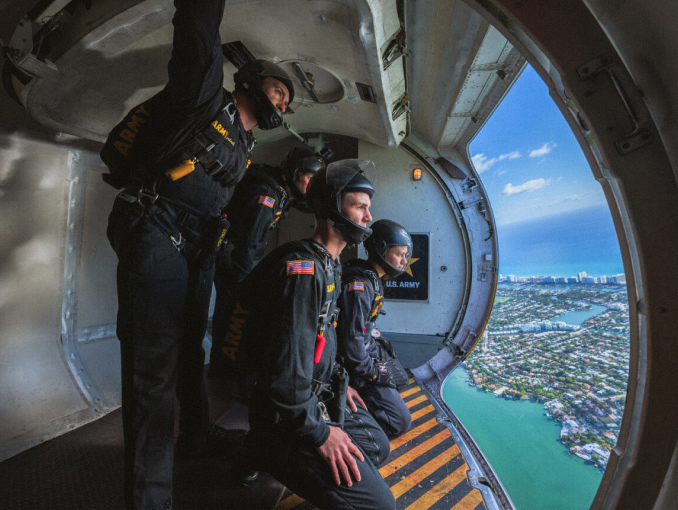Be disciplined.
You must have a clean military and civilian criminal or disciplinary record.
Combine your passion for skydiving with your desire for teamwork. As a Golden Knight, you’ll compete with the best and serve as an ambassador for the Army in communities across the nation and around the world.

The U.S. Army Parachute Team, known as the Golden Knights, is a combination of expert teams and Soldiers brought together by their love of skydiving. This includes parachute teams, aircraft pilots, and those who handle jump logistics behind the scenes. Whether you're free falling at 120 miles per hour or learning to land with expert precision, you’ll experience the pride and thrill of adventure while performing around the world as an elite unit.

The Demonstration Team excels under pressure performing for excited audiences at some of the largest festivals, airshows, and sporting events around the country. Consisting of 26 Soldiers, the Team showcases the benefits of Army service with people everywhere through the sport of skydiving.
Tandem Team is selected from experienced Demonstration Team members and specialize in passing along the gift of flight to first-time jumpers. From school teachers to community leaders, and celebrities, no one is better at helping you relax at 12,500 feet than Tandem Team. The team's skilled aerial videographers capture every moment and provide guests with stunning photos and videos to share with their friends.
The Competition Team takes it to the next level by matching their skills in several disciplines against some of the top civilian and military skydiving teams in the world. They compete at the national and world levels, earning some of the highest accolades in parachuting and skydiving history. These men and women train year round to represent the Army as the "Champions of the Skies.”
The Aviation Detachment, known as Team 6, represents some of the top fixed-wing pilots in the Army. They're responsible for operating the Golden Knight's fleet of aircraft used at performances around the world.
The Headquarters Section works behind the scenes and is responsible for leadership, organization, scheduling, training, logistics, and media relations for the Golden Knights. Together, they maintain the winning culture and attitude that allows the Team to perform at the highest level.
Golden Knights Extreme, also known as GK-X, performs exhibitions for audiences across disciplines like BASE jumping, wing suiting, and vertical formation skydiving. GK-X is the group of creative experts responsible for keeping the Golden Knights on the cutting edge of skydiving.
Perform
Perform
Around the
Around the
World.
World.
Get a glimpse of what it's like to be a champion of the sky. Watch the Golden Knights live, stay up to date with events near you, or download instructions to request an appearance.

While there's an opportunity for all members of the Army to become a Golden Knight, positions are highly competitive and meant for those dedicated to being a skydiving specialist. Soldiers must meet specific requirements to be considered.
You must have a clean military and civilian criminal or disciplinary record.
You must be Airborne qualified or willing to attend U.S. Army Airborne School.
You must perform a minimum of 100 military or civilian free-fall jumps.
You must submit an application packet for approval.
To become a member of the Golden Knights, you must first become a Soldier. See all the careers the Army offers and what it takes to join.

What started in 1959 as a small team competing against the former Soviet Union’s skydivers is now an international icon representing the Army’s success.

You have no saved jobs.
Take a short quiz or explore more than 200 jobs that might interest you.
Army Career Match